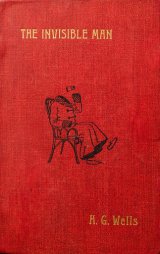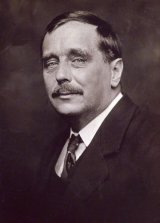The Invisible Man Page #12
The Invisible Man is a science fiction novel by H. G. Wells. Originally serialized in Pearson's Weekly in 1897, it was published as a novel the same year.
"Neither one thing nor the other," said the Voice. "Listen!" "Chump," said Mr. Marvel. "One minute," said the Voice, penetratingly, tremulous with self-control. "Well?" said Mr. Thomas Marvel, with a strange feeling of having been dug in the chest by a finger. "You think I'm just imagination? Just imagination?" "What else can you be?" said Mr. Thomas Marvel, rubbing the back of his neck. "Very well," said the Voice, in a tone of relief. "Then I'm going to throw flints at you till you think differently." "But where are yer?" The Voice made no answer. Whizz came a flint, apparently out of the air, and missed Mr. Marvel's shoulder by a hair's-breadth. Mr. Marvel, turning, saw a flint jerk up into the air, trace a complicated path, hang for a moment, and then fling at his feet with almost invisible rapidity. He was too amazed to dodge. Whizz it came, and ricochetted from a bare toe into the ditch. Mr. Thomas Marvel jumped a foot and howled aloud. Then he started to run, tripped over an unseen obstacle, and came head over heels into a sitting position. "Now," said the Voice, as a third stone curved upward and hung in the air above the tramp. "Am I imagination?" Mr. Marvel by way of reply struggled to his feet, and was immediately rolled over again. He lay quiet for a moment. "If you struggle any more," said the Voice, "I shall throw the flint at your head." "It's a fair do," said Mr. Thomas Marvel, sitting up, taking his wounded toe in hand and fixing his eye on the third missile. "I don't understand it. Stones flinging themselves. Stones talking. Put yourself down. Rot away. I'm done." The third flint fell. "It's very simple," said the Voice. "I'm an invisible man." "Tell us something I don't know," said Mr. Marvel, gasping with pain. "Where you've hid--how you do it--I don't know. I'm beat." "That's all," said the Voice. "I'm invisible. That's what I want you to understand." "Anyone could see that. There is no need for you to be so confounded impatient, mister. Now then. Give us a notion. How are you hid?" "I'm invisible. That's the great point. And what I want you to understand is this--" "But whereabouts?" interrupted Mr. Marvel. "Here! Six yards in front of you." "Oh, come! I ain't blind. You'll be telling me next you're just thin air. I'm not one of your ignorant tramps--" "Yes, I am--thin air. You're looking through me." "What! Ain't there any stuff to you. Vox et--what is it?--jabber. Is it that?" "I am just a human being--solid, needing food and drink, needing covering too--But I'm invisible. You see? Invisible. Simple idea. Invisible." "What, real like?" "Yes, real." "Let's have a hand of you," said Marvel, "if you are real. It won't be so darn out-of-the-way like, then--Lord!" he said, "how you made me jump!--gripping me like that!" He felt the hand that had closed round his wrist with his disengaged fingers, and his fingers went timorously up the arm, patted a muscular chest, and explored a bearded face. Marvel's face was astonishment. "I'm dashed!" he said. "If this don't beat cock-fighting! Most remarkable!--And there I can see a rabbit clean through you, 'arf a mile away! Not a bit of you visible--except--" He scrutinised the apparently empty space keenly. "You 'aven't been eatin' bread and cheese?" he asked, holding the invisible arm. "You're quite right, and it's not quite assimilated into the system." "Ah!" said Mr. Marvel. "Sort of ghostly, though." "Of course, all this isn't half so wonderful as you think." "It's quite wonderful enough for my modest wants," said Mr. Thomas Marvel. "Howjer manage it! How the dooce is it done?" "It's too long a story. And besides--" "I tell you, the whole business fairly beats me," said Mr. Marvel. "What I want to say at present is this: I need help. I have come to that--I came upon you suddenly. I was wandering, mad with rage, naked, impotent. I could have murdered. And I saw you--" "Lord!" said Mr. Marvel. "I came up behind you--hesitated--went on--" Mr. Marvel's expression was eloquent. "--then stopped. 'Here,' I said, 'is an outcast like myself. This is the man for me.' So I turned back and came to you--you. And--" "Lord!" said Mr. Marvel. "But I'm all in a tizzy. May I ask--How is it? And what you may be requiring in the way of help?--Invisible!" "I want you to help me get clothes--and shelter--and then, with other things. I've left them long enough. If you won't--well! But you will--must." "Look here," said Mr. Marvel. "I'm too flabbergasted. Don't knock me about any more. And leave me go. I must get steady a bit. And you've pretty near broken my toe. It's all so unreasonable. Empty downs, empty sky. Nothing visible for miles except the bosom of Nature. And then comes a voice. A voice out of heaven! And stones! And a fist--Lord!" "Pull yourself together," said the Voice, "for you have to do the job I've chosen for you." Mr. Marvel blew out his cheeks, and his eyes were round. "I've chosen you," said the Voice. "You are the only man except some of those fools down there, who knows there is such a thing as an invisible man. You have to be my helper. Help me--and I will do great things for you. An invisible man is a man of power." He stopped for a moment to sneeze violently. "But if you betray me," he said, "if you fail to do as I direct you--" He paused and tapped Mr. Marvel's shoulder smartly. Mr. Marvel gave a yelp of terror at the touch. "I don't want to betray you," said Mr. Marvel, edging away from the direction of the fingers. "Don't you go a-thinking that, whatever you do. All I want to do is to help you--just tell me what I got to do. (Lord!) Whatever you want done, that I'm most willing to do." CHAPTER X MR. MARVEL'S VISIT TO IPING After the first gusty panic had spent itself Iping became argumentative. Scepticism suddenly reared its head--rather nervous scepticism, not at all assured of its back, but scepticism nevertheless. It is so much easier not to believe in an invisible man; and those who had actually seen him dissolve into air, or felt the strength of his arm, could be counted on the fingers of two hands. And of these witnesses Mr. Wadgers was presently missing, having retired impregnably behind the bolts and bars of his own house, and Jaffers was lying stunned in the parlour of the "Coach and Horses." Great and strange ideas transcending experience often have less effect upon men and women than smaller, more tangible considerations. Iping was gay with bunting, and everybody was in gala dress. Whit Monday had been looked forward to for a month or more. By the afternoon even those who believed in the Unseen were beginning to resume their little amusements in a tentative fashion, on the supposition that he had quite gone away, and with the sceptics he was already a jest. But people, sceptics and believers alike, were remarkably sociable all that day. Haysman's meadow was gay with a tent, in which Mrs. Bunting and other ladies were preparing tea, while, without, the Sunday-school children ran races and played games under the noisy guidance of the curate and the Misses Cuss and Sackbut. No doubt there was a slight uneasiness in the air, but people for the most part had the sense to conceal whatever imaginative qualms they experienced. On the village green an inclined strong [rope?], down which, clinging the while to a pulley-swung handle, one could be hurled violently against a sack at the other end, came in for considerable favour among the adolescents, as also did the swings and the cocoanut shies. There was also promenading, and the steam organ attached to a small roundabout filled the air with a pungent flavour of oil and with equally pungent music. Members of the club, who had attended church in the morning, were splendid in badges of pink and green, and some of the gayer-minded had also adorned their bowler hats with brilliant-coloured favours of ribbon. Old Fletcher, whose conceptions of holiday-making were severe, was visible through the jasmine about his window or through the open door (whichever way you chose to look), poised delicately on a plank supported on two chairs, and whitewashing the ceiling of his front room.
Translation
Translate and read this book in other languages:
Select another language:
- - Select -
- 简体中文 (Chinese - Simplified)
- 繁體中文 (Chinese - Traditional)
- Español (Spanish)
- Esperanto (Esperanto)
- 日本語 (Japanese)
- Português (Portuguese)
- Deutsch (German)
- العربية (Arabic)
- Français (French)
- Русский (Russian)
- ಕನ್ನಡ (Kannada)
- 한국어 (Korean)
- עברית (Hebrew)
- Gaeilge (Irish)
- Українська (Ukrainian)
- اردو (Urdu)
- Magyar (Hungarian)
- मानक हिन्दी (Hindi)
- Indonesia (Indonesian)
- Italiano (Italian)
- தமிழ் (Tamil)
- Türkçe (Turkish)
- తెలుగు (Telugu)
- ภาษาไทย (Thai)
- Tiếng Việt (Vietnamese)
- Čeština (Czech)
- Polski (Polish)
- Bahasa Indonesia (Indonesian)
- Românește (Romanian)
- Nederlands (Dutch)
- Ελληνικά (Greek)
- Latinum (Latin)
- Svenska (Swedish)
- Dansk (Danish)
- Suomi (Finnish)
- فارسی (Persian)
- ייִדיש (Yiddish)
- հայերեն (Armenian)
- Norsk (Norwegian)
- English (English)
Citation
Use the citation below to add this book to your bibliography:
Style:MLAChicagoAPA
"The Invisible Man Books." Literature.com. STANDS4 LLC, 2025. Web. 10 Jan. 2025. <https://www.literature.com/book/the_invisible_man_138>.




Discuss this The Invisible Man book with the community:
Report Comment
We're doing our best to make sure our content is useful, accurate and safe.
If by any chance you spot an inappropriate comment while navigating through our website please use this form to let us know, and we'll take care of it shortly.
Attachment
You need to be logged in to favorite.
Log In